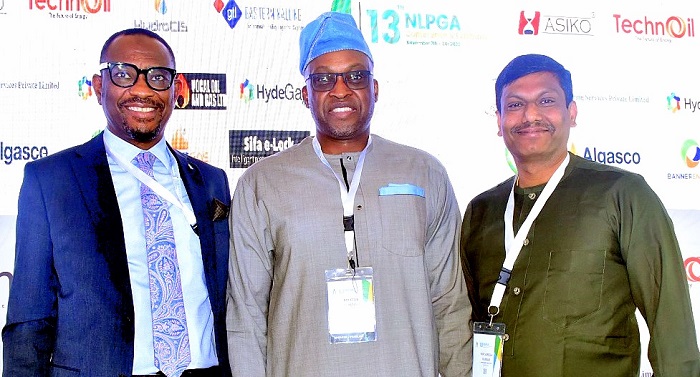L-R: MD Banner Gas Limited, Nubu Yakubu; President, NLPGA, Felix Ekundayo and MD NIPCO Plc, Suresh Kumar during the 13th NLPGA Conference & Exhibition in Abuja.
…Nigeria has untapped market of about 20 million households for rural community.
The Managing Director of Nigerian Independent Petroleum Company (NIPCO Plc), Suresh Kumar, explained at the 13th NLPGA Conference held in Abuja that the company has made massive investments in Liquefied Petroleum Gas (LPG) value chain with 11,000 MT coastal storage and over 100 skids and bottling plants across Nigeria with over 125 LPG tankers for logistics.
NIPCO has also donated gas accessories to boost usage across the country.
Statistics
The rural population in Nigeria was reported at 46.48 % in 2022, according to the World Bank collection of development indicators, compiled from officially recognised sources.
It is estimated that 90% of LPG usage is in the urban areas with just 10% in the rural areas. Hence, to deepen LPG usage, the rural area penetration should be improved.
Kumar stated that NIPCO plans to improve penetration in rural areas by 50 skids in the next 24 months.
He suggested that Federal and state governments are to help in providing basic infrastructure to rural consumers and work with local governments of the concerned areas to help create awareness and sensitisation.
The NIPCO Boss said, Nigeria has an untapped market of about 20 million households for rural community alone which equates to about 3 million tons annually.
Challenges for LPG Marketers
- Creating LPG awareness – Educating households
- Overcoming psychological barriers
- Developing bottling facilities
- Creating cost cost-effective distribution channel
Hurdles for Consumers
- Lack of knowledge and safety awareness about product, usage, and safe handling
- Psychological barriers – fear, resistance to change, cooking and eating habits, misconception of taste and quality of food cooked on LPG.
- Availability of cheaper fuels – wood, saw dust, charcoal
- Affordability – higher product cost (installation/accessories cost and refill price compared to other fuels) and low seasonal income levels.
- Reach – poor road conditions and underdeveloped infrastructure, lack of distribution channel
- Uncertainty over government policies on subsidy subsidy.
However, in rural Nigeria, an average woman spends around 5 to 6 hours per day in the kitchen in the most suffocating and unhygienic environment due to the use of traditional fuels, she spends an additional 2 to 4 hours in the collection of these fuels.
Strategies
There has to be low-cost distribution of mobile filling of cylinders through RMVs (Rural Mobile Vehicles).
Federal and state governments should improve sensitisation program especially in the realms of gas infrastructure.


Comment here